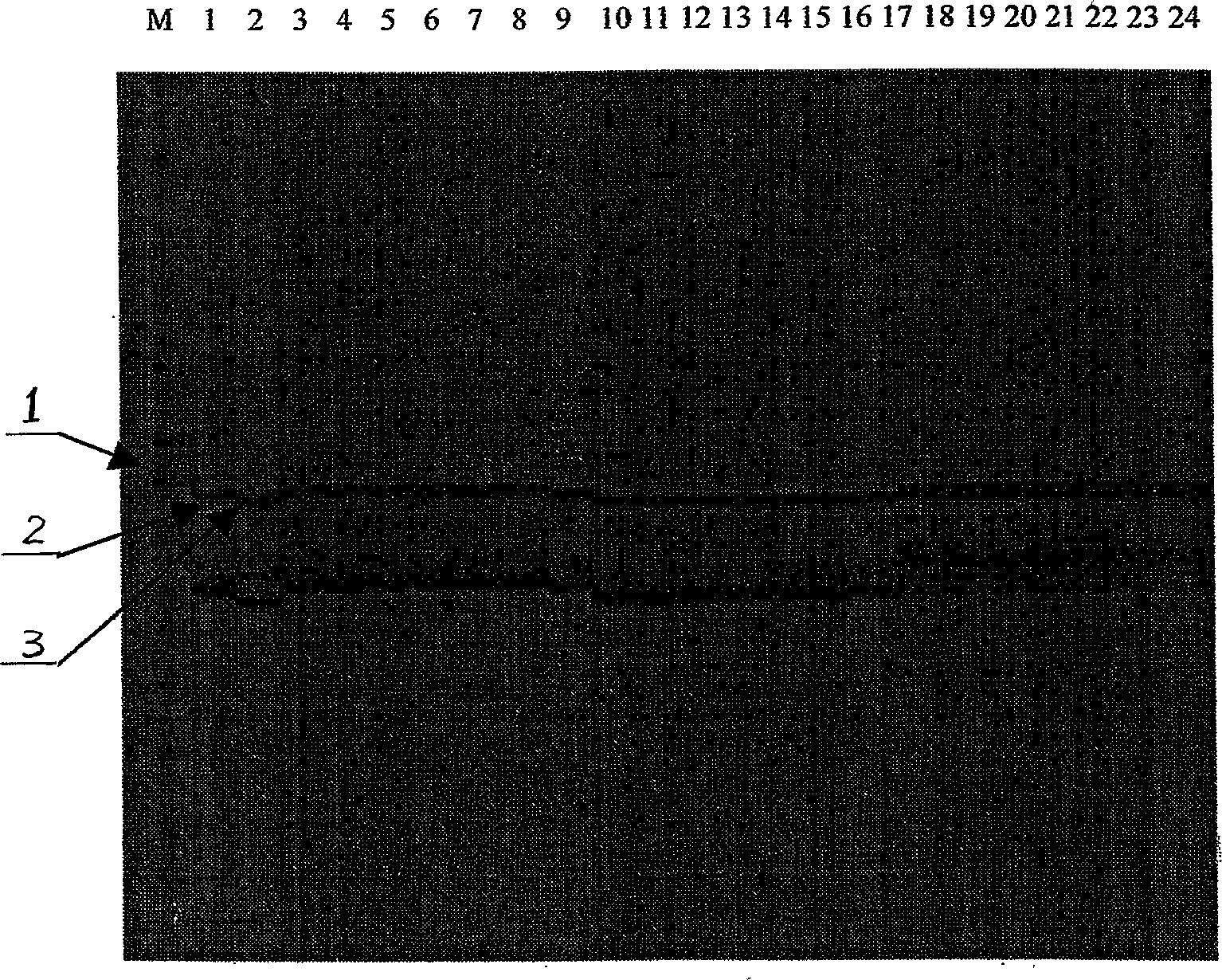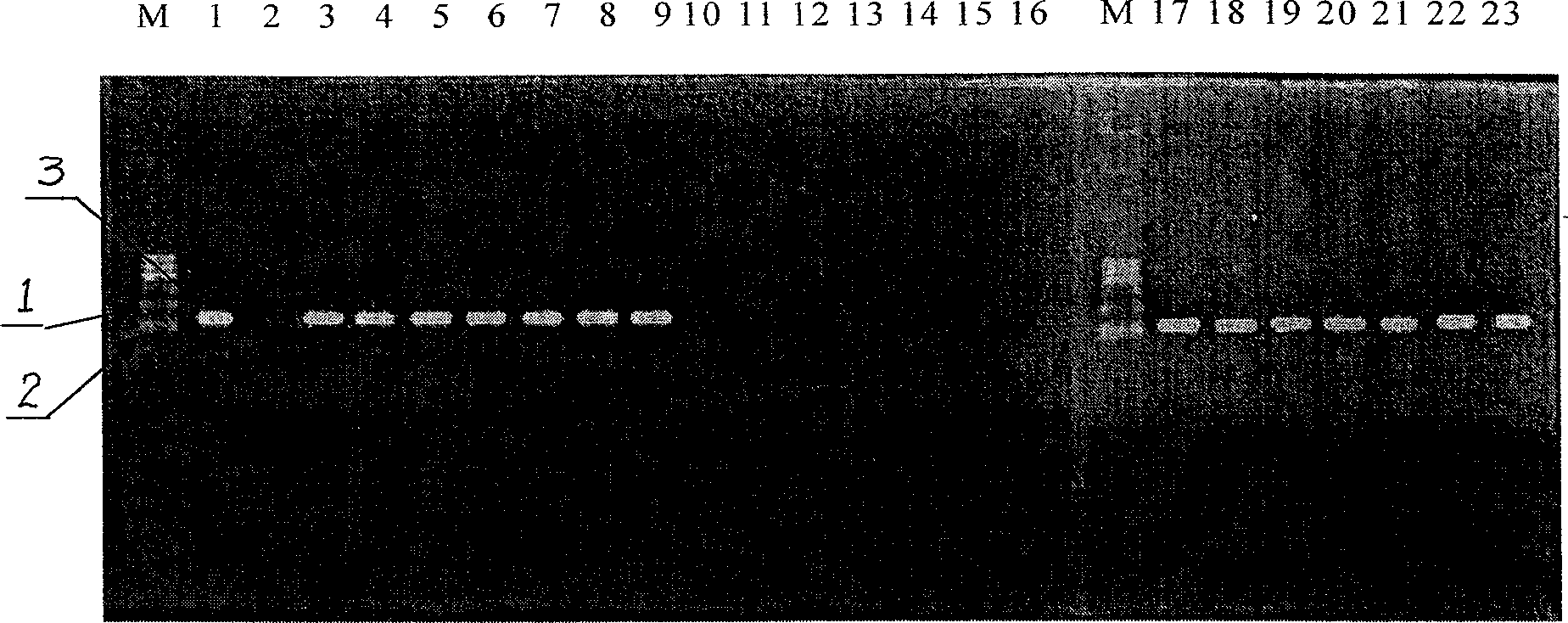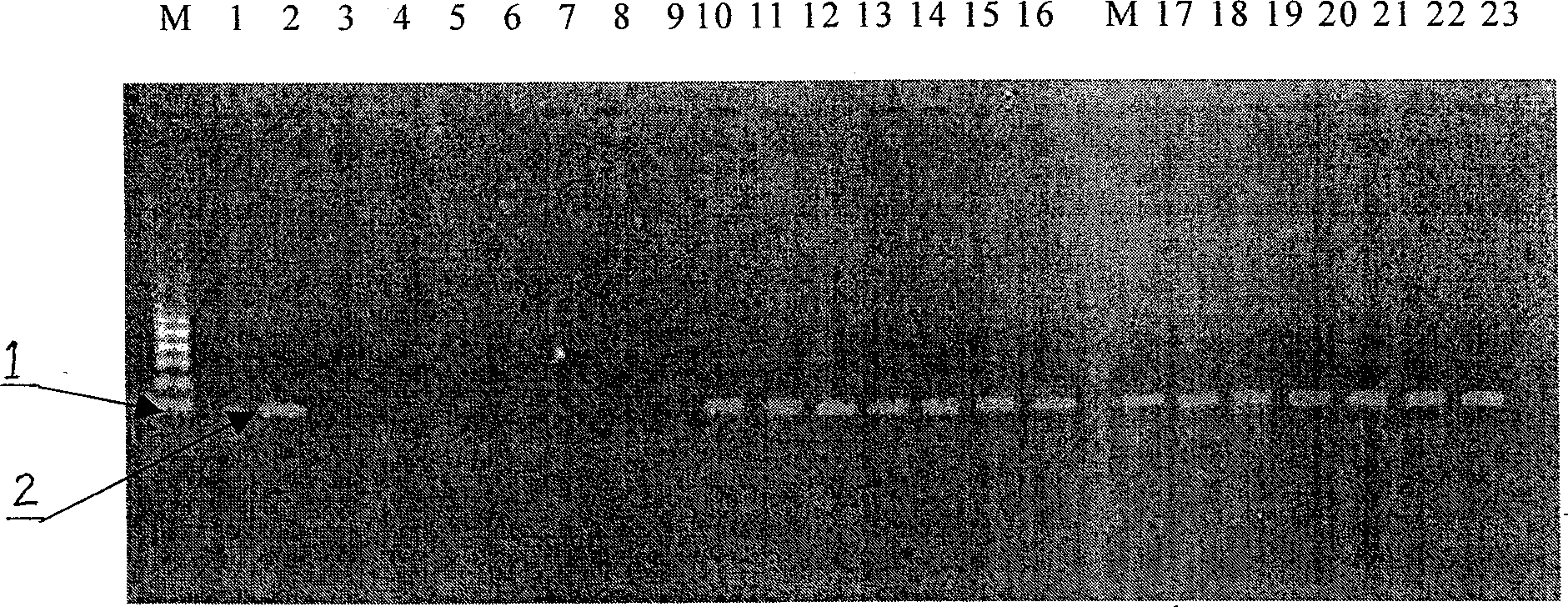Primer sequence for judging cucumber powdery mildew resistance and judging method therefor
A technology of cucumber powdery mildew and primer sequence, which is applied in the field of identification of primer sequence and identification of cucumber powdery mildew resistance, and can solve the problems of molecular markers that have not been reported.
- Summary
- Abstract
- Description
- Claims
- Application Information
AI Technical Summary
Problems solved by technology
Method used
Image
Examples
Embodiment 1
[0018] A method for identifying cucumber powdery mildew resistance using a primer sequence for identifying cucumber powdery mildew resistance, comprising the following steps: (1) extracting the DNA of the cucumber genome, the extraction method is a conventional method; (2) carrying out PCR amplification, in Put in a thin-walled tube dedicated to PCR amplification: cucumber genomic DNA 30ng, upstream primer 5′-CAG TAA ATG AAA GAA AAG AAG-3′30ng, downstream primer 5′-ATA CAT AGC CAT ACA AAA AT-3′30ng, dNTP 0.2mM, Mg 2+ 1.5mM, 1 times PCR buffer, 1 unit of Taq DNA polymerase, add sterile double distilled water to 20μl, put the special thin-walled tube for PCR amplification into a PCR instrument for amplification, and the amplification conditions are: 94°C Pre-denaturation for 300 seconds, denaturation at 94°C for 60 seconds, annealing at 48°C for 60 seconds, extension at 72°C for 120 seconds, 35 cycles, and extension at 72°C for 420 seconds, the amplification is complete; (3) Gel...
Embodiment 2
[0020] A method for identifying cucumber powdery mildew resistance using a primer sequence for identifying cucumber powdery mildew resistance, comprising the steps of: (1) extracting the DNA of the cucumber genome, the extraction method is a conventional method; (2) performing PCR amplification, in Put into a thin-walled tube dedicated to PCR amplification: cucumber genomic DNA 15ng, upstream primer 5′-CAG TAA ATG AAA GAA AAG AAG-3′20ng, downstream primer 5′-ATA CAT AGC CAT ACA AAA AT-3′20ng, dNTP0.15mM, Mg 2+1.2 mM, 1 times PCR buffer, 1.2 units of Taq DNA polymerase, add sterile double distilled water to 20 μl, put the special thin-walled tube for PCR amplification into a PCR instrument for amplification, and the amplification conditions are: 94°C Pre-denaturation for 180 seconds, denaturation at 94°C for 60 seconds, annealing at 47°C for 40 seconds, extension at 72°C for 60 seconds, 25 cycles, and extension at 72°C for 300 seconds, the amplification is complete; (3) Gel ele...
Embodiment 3
[0022] A method for identifying cucumber powdery mildew resistance using a primer sequence for identifying cucumber powdery mildew resistance, comprising the following steps: (1) extracting the DNA of the cucumber genome, the extraction method is a conventional method; (2) carrying out PCR amplification, in Put in a thin-walled tube dedicated to PCR amplification: cucumber genomic DNA 20ng, upstream primer 5′-CAG TAA ATG AAA GAA AAG AAG-3′40ng, downstream primer 5′-ATA CAT AGC CAT ACA AAA AT-3′40ng, dNTP 0.25mM, Mg 2+ 2.0 mM, 1 times PCR buffer, 0.8 units of Taq DNA polymerase, add sterile double distilled water to 20 μl, put the special thin-walled tube for PCR amplification into a PCR instrument for amplification, and the amplification conditions are: 94°C Pre-denaturation for 240 seconds, denaturation at 94°C for 60 seconds, annealing at 53°C for 60 seconds, extension at 72°C for 100 seconds, 30 cycles, and extension at 72°C for 600 seconds, the amplification is complete; (...
PUM
 Login to View More
Login to View More Abstract
Description
Claims
Application Information
 Login to View More
Login to View More - R&D
- Intellectual Property
- Life Sciences
- Materials
- Tech Scout
- Unparalleled Data Quality
- Higher Quality Content
- 60% Fewer Hallucinations
Browse by: Latest US Patents, China's latest patents, Technical Efficacy Thesaurus, Application Domain, Technology Topic, Popular Technical Reports.
© 2025 PatSnap. All rights reserved.Legal|Privacy policy|Modern Slavery Act Transparency Statement|Sitemap|About US| Contact US: help@patsnap.com



